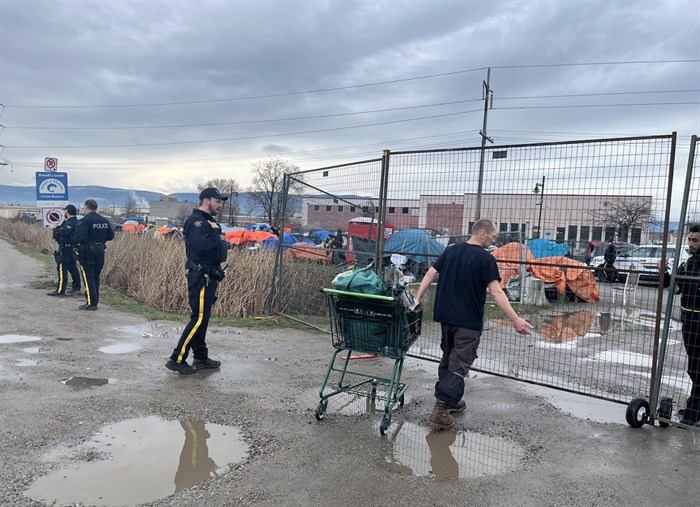Why Kelowna's treatment of homeless encampments has changed over the years

The addition of fences, security guards, identification stamps and a lots of cops at the end of March changed the landscape at the homeless tent city along a section of the Okanagan Rail Trail in Kelowna.
Some called it dystopian, others said it was necessary.
The city’s actions were more compassionate than they have been in the past, but experts say there's a long way to go before homeless people living in encampments have their right to survival balanced fairly with people’s desire for a visually appealing cityscape.
“If municipalities are left kind of holding the bag, it doesn't excuse them from fulfilling their constitutional responsibilities,” UBC law professor Stepan Wood said. “Often municipalities find they are balancing the housed residents' interests in recreation and tidy, orderly spaces, aesthetically pleasing public space, on the one hand, with unhoused people's ability to survive. And it is often the interests of the taxpaying residents that outweigh the really more fundamental interests in basic human dignity and survival.”
On March 26, the City of Kelowna cleared the encampment for its annual “spring cleanup” and then created rules and procedures to regulate the camp like an indoor shelter. There are allotted camping sites, security measures, overflow sections for overnight shelter only and other rules meant to regulate the site.
“It is clear that the status quo is not working, for those sheltering there, for first responders, or for the surrounding community. It’s time to do something different,” mayor Tom Dyas said in a statement. “At the same time, we must ensure the site remains safe for everyone.
"That’s why we are implementing enhanced health and security measures, including 24/7 security and controlled access. These changes will create a safer, more structured environment for those seeking peaceful shelter and a path to stable housing. We are also maintaining space for those needing overnight shelter, ensuring continued access to essential services and support.”
There were several arrests during the cleanup including a woman living in the camp who said she was separated from her dog. There were other allegations made online that people were mistreated and their belongings thrown out.
The city's community safety director Kevin Mead said the parks and recreation bylaw allows the city to restrict access to the encampment along the rail trail.
READ MORE: Big changes coming to Kelowna’s tent city after ‘spring cleanup’
Wood has examined how cities and the provincial government have treated homeless encampments like the one on the Okanagan Rail Trail in Kelowna. He said municipalities have been gradually changing how they deal with tent cities.
“It's mainly a sort of follow-on effect of the changing legal understanding or situation. So that around 2021, 2022, the courts in BC and across the country started to recognize that clearing these tent cities doesn't solve any problems, and that it actually tends to make the situation more precarious and worse in terms of the lives and health of unhoused people,” the UBC law professor said.
The rail trail site in downtown Kelowna has been evolving over time from strictly temporary to semi-permanent, and now to a hybrid model that is more regulated.
Ron Mattiussi spent 13 years as the city manager in Kelowna before retiring in 2018. He said the city used to just go in and tear tent cities down before they could become established.
“We never had press conferences when, you know, five or six tents started piling up, and a very vocal group of people said that they were going to create a tent city. We just went in and took it down,” Mattiussi said. “We saw a shift, and certainly at my time the idea was not to let it get established.”
He said Kelowna has limited resources to deal with a complicated problem that ends up being its responsibility rather than the provincial or federal governments.
“It's not up to the city, whose source of revenue is property taxes, to handle mental illness and drug addiction, which is clearly a provincial, and to some degree a federal problem,” he said. “The two things cities traditionally do, police and bylaw enforcement, are not particularly great tools to deal with mental illness and drug abuse.”
Wood said cities found that the approach of going in with police and bylaw and simply tearing down encampments wasn’t working.
“Municipalities around the entire country started to realize this kind of constant 'whack-a-mole evict and move on sort of approach' was no longer really available to them, at least not reliably. And that they were in a legal position where they might not be able to just do that without legal consequences,” the UBC prof said.
The legal precedence for cities dealing with homeless encampments is a complex situation.
A survey by the UBC Allard School of Law and Centre for Law and the Environment found that there were 24 court decisions between 2000 and 2022 in B.C. against homeless encampments that allowed cities to go in and dismantle camps.
Out of those 24 decisions, 20 were interlocutory and final, which means a decision that is usually supposed to be temporary ended up being the final decision. Only one decision actually came after a full trial.
“I don't think there's any clear kind of legal precedent yet about what the limits are on how the city can regulate these spaces,” Wood said. “The main kind of check on what the cities do with these is the possibility of a Charter of Rights challenge by the residents themselves... the right to life, liberty and security of the person.”
He said there are numerous examples of cities using different methods to deal with encampments but few have been tried and tested in court for the unsurprising reason that homeless folks often don’t have the resources to organize a lawsuit after they have been evicted from their camp.
Kelowna cited typical concerns about safety, fire risks and waste disposal when justifying how it handled the cleanup of the rail trail camp. Wood said near Vancouver the same justification was used to regulate an encampment in Maple Ridge.
READ MORE: Arrests made during Kelowna rail trail homeless encampment 'spring cleanup'
The provincial government passed Bill 45 in November 2023 about what kind of alternative shelter needs to be available in order for a city to evict people from camps on municipal land. The bill was shelved since no one could agree on what an acceptable standard for alternative shelter is.
“In the summer of 2024, the province basically said they're shelving it indefinitely. And the main reason was that nobody was happy with it," Wood said. "The housing or homelessness advocates said the standard is way too low. Basically, it tramples all over the rights of unhoused people. And the municipalities said the standard is way too high. We can't meet that standard."
Kelowna's former city manager Mattiussi said it is a situation where almost no matter what a city does someone is going to complain.
“It's really hard to get that formula just right,” he said. “You're going to get criticized for whatever you do.”
Cities have to allow overnight sheltering but there isn’t a concrete law forcing cities to allow daytime sheltering, which means municipalities can force homeless folks to pack up their stuff every morning.
A break in the pattern of unchallenged municipal action came this January when the BC Civil Liberties Association filed a lawsuit against the City of Vancouver to challenge its bylaw that bans daytime outdoor sheltering.
“Unhoused people deserve to have their government treat them with dignity and respect. Instead, many municipalities choose to enforce bans on daytime sheltering with callous cruelty by forcing people to either carry their belongings around all day or be violently decamped if they try to shelter,” the association said in a press release in January.
Wood said cities and courts around the province and across the country are doing what Kelowna’s doing, trying different methods to see what works.
“The new reality is that cities are trying to figure out how to manage tent cities rather than just how to get rid of them,” he said.
To contact a reporter for this story, email Jesse Tomas or call 250-488-3065 or email the editor. You can also submit photos, videos or news tips to the newsroom and be entered to win a monthly prize draw. Find our Journalism Ethics policy here.
We welcome your comments and opinions on our stories but play nice. We won't censor or delete comments unless they contain off-topic statements or links, unnecessary vulgarity, false facts, spam or obviously fake profiles. If you have any concerns about what you see in comments, email the editor in the link above. SUBSCRIBE to our awesome newsletter here.



